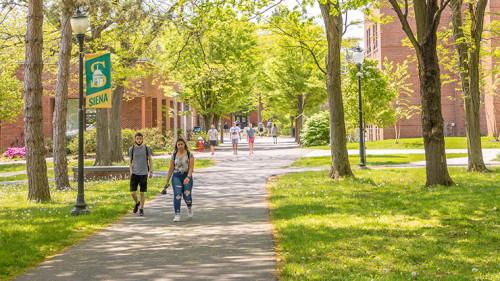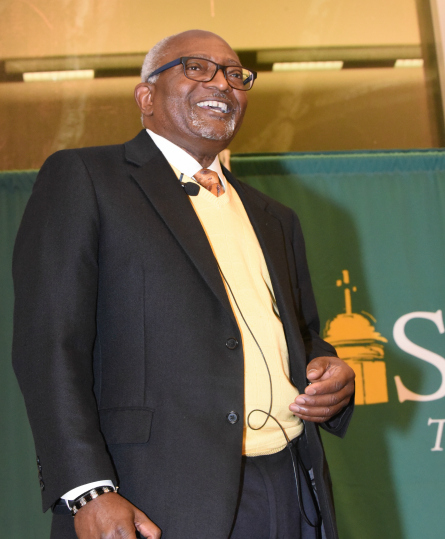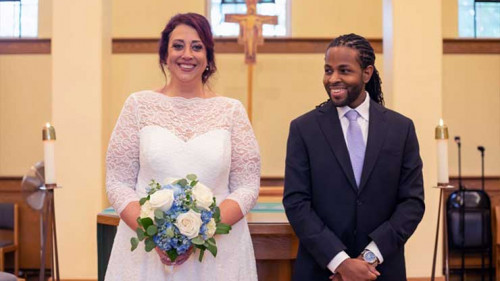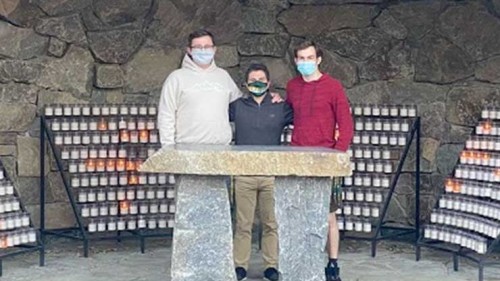

To view more photos of the event, click here.
With enthusiastic rapid-fire delivery and a subtle sense of humor, the “father of environmental justice” addressed a full house on March 28 for Siena’s 30th annual Martin Luther King Jr. and Coretta Scott King Lecture Series event.
Dr. Robert Bullard is the author of 18 books on sustainable development and environmental racism, one of which, Dumping in Dixie: Race, Class and Environmental Quality, is considered a standard text on the subject.
Dr. Bullard said that “fairness, justice and equity are the three pillars at the central core” of environmental justice.
“Ask yourself, who has the right to pollute? No one. A permit to build is not a right to pollute. It is not a right to kill or to make people sick.”
Dr. Bullard, a sociologist by training, spoke of the painstaking work he and his students did to research injustice in the days before GPS and the Internet, when records were looked up on microfiche in public libraries, and paper maps with colored coded pins kept track of discoveries.
“I don’t do old white man sociology – I do kick-ass sociology,” he told the gathering, with apologies for “cursing at a Catholic college.”
What he and other researchers found was that for decades, landfills, dumps, refineries, and chemical waste sites have been situated near neighborhoods where the least powerful citizens in our society live. He has dedicated his career and his life to researching the statistics to prove this, and agitating for the necessary legislative and regulatory change to protect the environment and promote equality for all, regardless of skin color or socioeconomic status.
“I learned that all major changes come from the grassroots. You do a study, you write an article, you testify, you work on a policy, you get out in the community – that’s how change happens.”
His work, and the sociological studies of others like him in a variety of fields, became known as “community-based participatory research,” which meant literally going out in the community to talk to the people who lived there and were directly impacted by the issues being studied. Extremely detailed notes and records backed up by multiple sources are a hallmark of this kind of work.
Dr. Bullard showed slides of oil refineries in the South belching smoke close to children playing on playground equipment, sometimes donated to the neighborhood by the oil companies.
In some of these towns, he said the majority of residents – usually poor, usually minorities – suffer from asthma and other respiratory problems.
“Pollution is segregated, and it’s not random. These landfills and refineries are deliberately located where lower income people of color live. Your zip code is the most potent indicator of your health.”
He showed the audience a flurry of slides with statistics backing up his statements, and showing that his native South is the “most environmentally degraded region of the nation.”
Dr. Bullard’s passionate sense of injustice was honed growing up in mid-20th century Alabama.
“The ‘Whites Only’ signs had come down and the laws had technically changed, but the attitude was still Jim Crow,” he said.
He concluded by saying he is optimistic about younger people getting involved in environmental advocacy.
“Assume leadership. Take charge. Be aware of what’s happening in the world,” he encouraged the audience. “Justice must permeate everything we do.”
Casey Seiler, state editor for the Times Union (one of the King lecture series sponsors) introduced Dr. Bullard by noting that the evening’s event was being held “mere hours after President Trump rolled back many of the environmental protections instituted by President Obama, and weeks after the Senate approved a new head of the EPA, whose only previous experience with environmental issues was to level multiple lawsuits against the agency he now heads. These are strange times indeed.”
The winners of the 2017 Student Courage Awards were presented with certificates at the lecture: Amber Martin, a senior at Pine Bush High School in Middletown; Tasnim Naina, a sophomore at Guilderland High School; and Jordan Bartlett, a seventh-grader at Draper Middle School in Schenectady. They were recognized for “their personal courage by taking positive action about racism, prejudice…and other forms of intolerance in their communities.”

